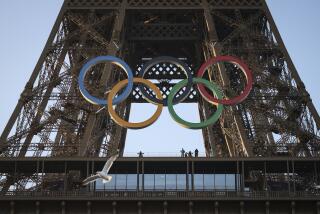NBC Looking Over Shoulder in Sweeps Battle
- Share via
The headlines could be written now: “NBC wins the February Sweeps.”
Then again, the Chicago Daily Tribune was sure that Dewey had defeated Truman.
The Peacock network has had a lock on the prime-time Nielsen ratings for three years: It was No. 1 for the past two seasons; it has finished first every week this season but one; it has the Nos. 1- 2- 3- and 4-rated shows of the season; it has been No. 1 for a record-tying 11 straight Sweeps periods and is the favorite to make it 12 in a row this month.
But this year’s February Sweeps, which begin Wednesday, are far from typical. ABC’s extensive coverage of the XV Olympic Winter Games--beginning Feb. 13 and continuing for more than 90 hours over the following 15 days--could make it a contest.
The sweeps ratings are important more for the networks’ affiliated stations than for the networks themselves. February is one of only four times a year that the viewership of every station in the country is measured, and the ratings are used to help set advertising rates for the months ahead. (May, July and November are the others, although stations and networks don’t typically do special programming for the summer period.)
Where the sweeps ratings may prove crucial to the networks this year is in the battle for second in the 1987-88 season.
Even if ABC doesn’t grab the sweeps gold with its Olympic coverage, network executives are hoping they will generate a one-two punch with strong ratings and promotional push for its March programming that will give ABC a shot at beating CBS for runner-up status in the full-season sweepstakes, which conclude in mid-April.
It would be the first time in four years that ABC has escaped the prime-time ratings cellar and, more significantly, the first time that CBS ever had finished third.
So far this season, the A.C. Nielsen Co. shows NBC averaging a 16.4 rating in prime time, with CBS drawing a 13.7 and ABC a 13.2. Each rating point represents 886,000 households.
Most analysts agree that NBC’s schedule is so strong that its current lead for the season is virtually insurmountable, but CBS is less comfortable with its half-point hold on second.
In TV terms, the Olympics are a quantity of unpredictable worth. Like the dollar, their value depends on uncontrollable conditions and can fluctuate daily.
There is little on which to base Olympics projections. The 1980 games in Moscow were blacked out by a U.S. boycott, making the 1984 games at Sarajevo, Yugoslavia, the only comparable broadcast since the proliferation of cable, which offers sports fans alternatives to network fare.
While ABC’s 18.5 prime-time ratings average from Sarajevo that February did propel the network to a sweeps tie with CBS--and the 1984 Summer Games in July provided ABC with its last sweeps victory--viewership fell below levels expected by the network. And the edge that those ratings gave ABC in the sweeps came when CBS’ dominance already was waning--unlike NBC’s current position of strength. And ABC was a solid second at the time, not third as it is now.
The big question, then, is how viewers will respond to ABC’s offering of 10 weeknights and three weekends of nothing but Olympics. Will the aging stars of the CBS team be able to go the distance against ABC’s youthful athletes? Will they collapse when the young stars take the field in Calgary? Will anyone tune away from NBC long enough to notice?
NBC, for one, thinks they will.
“The Olympics are a very attractive event,” insisted NBC’s Bill Rubens, vice president of research, “and we’ve assumed a reasonably good performance in general.”
Its success, he said, will depend on unpredictable factors: the emergence of American stars, how competitive the events prove to be--even weather conditions. Too much snow disrupted event schedules in 1984, hurting ABC’s early coverage and ratings.
The performance of special counterprogramming--such as NBC’s “Noble House” (Feb. 21-24)--also will help determine the Olympics’ ratings outcome, Rubens said.
“Traditionally, that kind of a miniseries has done well against the Olympics because it’s tailored to a counter audience,” Rubens said. “Both we and CBS did very well with minis in ’84.”
Peter Tortorici, CBS’ new vice president of planning and scheduling, is hoping Rubens is right. He said his network has “strategically placed” two miniseries (“Windmills of the Gods” on Sunday and Tuesday, and “Bluegrass,” airing Feb. 28-29) around the Olympics coverage because “we want to put our best foot forward in the week before and after.”
But will it be enough to finish second in the sweeps?
He insisted that CBS has more interest in the long haul and considers it “misguided” to be so focused, but he conceded: “Of course we want to finish ahead of ABC. Do we expect to? I don’t know. David Poltrack (research chief at CBS) has a better handle on those things. His projection is that we will finish second. There’s a chance that will happen.”
These Olympics, said the former CBS Sports executive, offer so many new variables to the mix “that even good students of sports history can’t apply what they know to these games.”
“If we’re lucky and breaks don’t go ABC’s way,” Tortorici concluded, “we will get more people (than ABC).”
ABC is the only network less than eager to talk about the impact of the Olympics. Dennis Swanson, president of ABC’s sports division, last month told the nation’s press he hoped the Olympics would “have a positive impact” on the network’s season average but that was as far as he would go.


